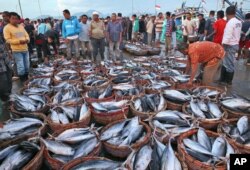Peru joined Indonesia Wednesday as the only two countries worldwide to commit to make their fishing boat tracking data available to the public.
Such access will give conservationists, along with those who buy, sell and eat seafood, a clearer picture where their favorite dishes come from.
Officials from both countries made their announcements Wednesday at the United Nations Ocean Conference in New York.
Indonesia said its data is available now, while Peru promised to follow suit.
"This is another demonstration of the Peruvian government's commitment to fight illegal activities at sea," fisheries vice minister Hector Soldi said. "The Peruvian government intends to make the utmost effort to achieve sustainable management of our fisheries in order to increase its contribution to nutrition and global food security."
The independent Global Fishing Watch uses satellites and terrestrial receivers to track the activities of 60,000 commercial and private fishing boats across the globe.
Global Fishing Watch is not an enforcement agency but a tool for environmentalists, conservationists and the general public to follow what's happening on the open ocean.
Jackie Savitz, senior vice president of the Oceana conservation group, tells VOA that once a fishing boat leaves port and disappears over the horizon, it's hard to monitor the vessels. For example, she says, are they fishing in protected parts of the sea or encroaching into another country's exclusive economic zone?
Savitz says she applauds the very strong leadership by Indonesia and Peru in allowing anyone to monitor their fishing boats at any time.
"With more eyes on the ocean, there are fewer places for illegal fishers to hide," she said.
Savitz says she hopes other countries will follow Indonesia and Peru in helping to ensure the sustainability and health of one of the world's most valuable resources.

